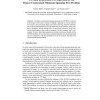Free Online Productivity Tools
i2Speak
i2Symbol
i2OCR
iTex2Img
iWeb2Print
iWeb2Shot
i2Type
iPdf2Split
iPdf2Merge
i2Bopomofo
i2Arabic
i2Style
i2Image
i2PDF
iLatex2Rtf
Sci2ools
107
click to vote
WEA
2007
Springer
2007
Springer
A Primal Branch-and-Cut Algorithm for the Degree-Constrained Minimum Spanning Tree Problem
The degree-constrained minimum spanning tree (DCMST) is relevant in the design of networks. It consists of finding a spanning tree whose nodes do not exceed a given maximum degree and whose total edge length is minimum. We design a primal branch-and-cut algorithm that solves instances of the problem to optimality. Primal methods have not been used extensively in the past, and their performance often could not compete with their standard ‘dual’ counterparts. We show that primal separation procedures yield good bounds for the DCMST problem. On several instances, the primal branch-and-cut program turns out to be competitive with other methods known in the literature. This shows the potential of the primal method.
| Added | 09 Jun 2010 |
| Updated | 09 Jun 2010 |
| Type | Conference |
| Year | 2007 |
| Where | WEA |
| Authors | Markus Behle, Michael Jünger, Frauke Liers |
Comments (0)

